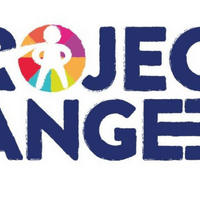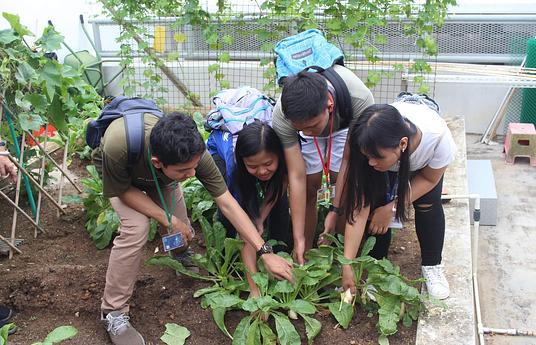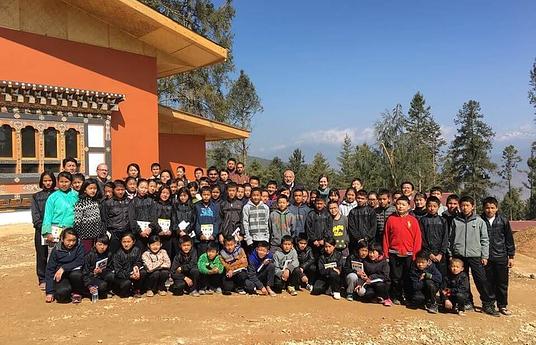The importance of helping learners develop holistically has been in discussion for a long time, and the disruptions caused by the pandemic have highlighted the joint role of parents and schools in educating the learners.“Education is a lifelong process where a learner is constantly raising their bar. Education, just like us, needs to be holistic – one that is dynamic, responsive, and open to new ideas and change. “
"Education is a lifelong process where a learner is constantly raising their bar. Education, just like us, needs to be holistic – one that is dynamic, responsive, and open to new ideas and change."
Social, Emotional, Spiritual aspects of the learners’ growth require equal emphasis as the physical and cerebral areas. HundrED and Druk Gyalpo’s Institute released a report on Holistic Education in South and Southeast Asia that identifies innovations that are helping learners develop holistically.
The report highlights that education is a lifelong process where a learner is constantly raising their bar. Education, just like us, needs to be holistic – one that is dynamic, responsive, and open to new ideas and change.
The process of learning, curriculum, assessment, and reporting must constantly evolve in order to help learners develop holistically.
The Holistic Education Spotlight report highlights nine innovations that were selected from a total of 183 submissions, reviewed by an advisory board of 30 experts in education from around the world including current: academics, innovators, teachers, students, and leaders in education.
“There is a need to reimagine the way we define the purpose of education so that the education systems are able to create a conducive environment for the learners to actualize their potential.”
The innovations highlighted the social and emotional aspects of developing and the need to help learners develop skills rather than learning static content. There are many aspects of growth that the educators and parents must be mindful of as highlighted by the innovations
Each of the innovations highlighted in the report were chosen in part because of that inherent scalability and the ease with which they could be adapted and replicated elsewhere in the world.
“There is a need to reimagine the way we define the purpose of education so that the education systems are able to create a conducive environment for the learners to actualize their potential.” the report says. This calls for education systems around the world to evolve the process of learning that they are designed so that their learners can actualize their potential and become members of a just and harmonious society.
The 9 innovations selected for the Holistic Education in South & Southeast Asia Spotlight Project
 | Colors of Kindness, Bangladesh - An education-in-emergencies adaptation for the Rainbow of Education. Using social and emotional learning materials delivered via podcast, this EdTech solution seeks to address the disruption of education due to global crises. The program aims to enhance the well-being of teachers and children, social inclusion, and equitable access to a holistic education for all children. | |
 | Cung hoc project, Vietnam - "Cung hoc" is the nucleus of a community of 1.2 million Vietnamese passionate, dynamic and creative teachers. This project aims to improve education in Vietnam through capacity building for Vietnamese teachers across the country. We focus on 3 main values: Enthusiastic, Dynamic and Creative
| |
 | Magical U, Thailand - Magical U is a simple and powerful game that allows a child to release negative emotions and memories from their subconscious. It enables them to connect with their feelings through pictures, express themselves through play and choose how they want to feel. In a world full of challenges and problems, nothing more important than EQ, empowerment and inspiration based on subconscious programing. | |
 | Slam Out Loud, India - Slam Out Loud is a for-mission, non-profit that places professional artists in classrooms for a 5-year program and through lived experience create scalable, contextualised learning products. SOL enables children from the most vulnerable communities to find their voice through creative expression, build socio-emotional learning and 21st-century skills to dream bigger and create their future. | |
' | Saturday Art Class, India - Saturday Art Class is a not-for-profit social organization operating in the education sector. It is a school-based intervention, working towards socially and emotionally empowering children from low-income communities; by taking them through a process of creative exploration and expression as a means to facilitate Social and Emotional Learning (SEL) integrated with Art | |
 | Chili Padi Academy, Indonesia - Increasingly, there is an urgent need to build transboundary collaboration to solve complex environmental and social challenges. Chili Padi Academy aims to facilitate this via an environmental leadership and accelerator programme for senior high school students in Southeast Asia that nurtures a community of environmental leaders invested in collaboration and the healthy development of the region. | |
 | Reap Benefit, India - Reap Benefit is building a tribe of problem-solving citizens who drive change in their local communities by solving everyday issues using local data, local solutions and local campaigns. The experiential learning is amplified by hands-on activities, Do-It-Yourself Solution kits, civic games and Reap Benefit’s technology platforms, which includes a Web App, a WhatsApp Chatbot, and a Civic Forum. | |
 | Ritinjali’s Second Chance School / Pallavanjali Institute for Actualisation of Individual Potential, India - The Second Chance School is a transformational programme that nurture young minds in an environment that is unbiased and helps them identify their individual potential. We empower the youth to integrate socially and excel professionally by offering them wide spectrum of high quality training for work-readiness (Soft-skills, life skills, computer skills & Industry based apprenticeships) | |
 | Project Rangeet, India - Mobile app for facilitators to deliver Social Emotional & Ecological Knowledge (SEEK) to children aged 7-16, developed around the UN SDGs. Core element of education. Multiple intelligence & play-based methods ensure every child benefits. Develops the whole child & builds strong communities. Includes tools to measure impact. Works in any geographic or socioeconomic context, school or community. |
Download the Holistic Education Spotlight Report from the HundrED website to learn more about the 9 innovations that are promoting holistic education in South and Southeast Asia.




